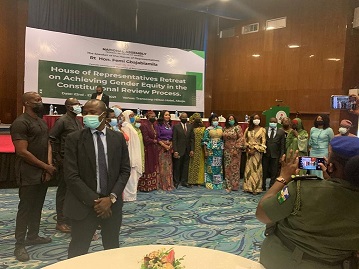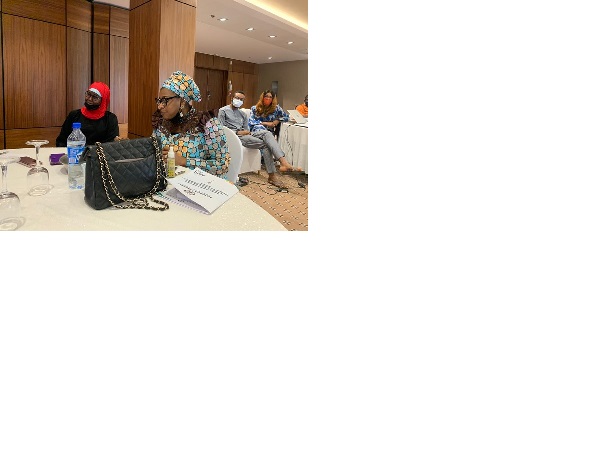NIGERIAN FEMALE PARLIAMENTARIANS MOBILIZE STRATEGIC TECHNICAL SUPPORT FOR ACHIEVING GENDER EQUITY IN THE 2021 CONSTITUTION REVIEW PROCESS
WRITES LADY NKIRU CELINE OKORO
- Are you a Nigerian?
- Are you concerned, angry, sad, worried, or perhaps uncomfortable with the dwindling number of women, youths, and persons living with disabilities in the governance and public spaces in Nigeria especially post 2019 general elections?
- Are you aware, that there is only 3.2% female representation in the Federal House of Representatives, the worst in Sub-Saharan Africa, and that the Federal Executive Council as currently constituted has only 16.2% female members down from 33% in May 2015?.
- Are you aware that the Ninth National Assembly (2019 – 2023) in September 2020 set up a Constitution Review Committee?;
- Do you know that The Constitution Review Committee has called on the general public to submit memoranda on any aspect of the constitution they feel strongly is not working for the peace, security, equity, effective growth, and development of Nigeria?
- Have you or any of the groups you belong to or represent submitted any memoranda to the constitution Review committee on any aspect of the 1999 Nigerian constitution as amended that is not aligned to or in consonance to the needs and aspirations of women, youths, and persons with disabilities?

Participants at the Two Day Retreat
In line with the above, the office of the Speaker of the Federal House of Representatives and the Female Caucus Group of the Ninth Assembly with support from the National Democratic Institute (NDI) on April 22nd and 23rd, 2021 held a retreat at Transcorp Hilton Hotel Abuja on “Achieving Gender Equity in the Constitution Review Process”.
The retreat had in attendance The Speaker of The Federal House of Representatives Rt. Honorable Femi Gbajabiamila, most female parliamentarians in the ninth Assembly, core gender professionals, the academia, and activists including Professor Ayo Atsenuwa, Deputy Vice-Chancellor ( Development Services), University of Lagos, Dr. Chino Obiagwu (SAN) – Executive Director, Legal Defence and Assistance Project (LEDAP) and Dr. Abiola Akiyode Afolabi- Executive Director, Women Advocates, Research & Documentation Center (WARDC).
The retreat sought among other things to
- Support Female parliamentarians to review recommendations on gender-sensitive constitution alteration;
- Provide a credible, effective and efficient platform for female parliamentarians to build consensus on constitutional alterations possible to increase the participation of women in politics ahead of 2023 general elections.
To this end, the retreat identified five major sections of the constitution requiring urgent alterations to include
- Section 14: 3 establishing Federal Character to include provisions for gender equity and equal opportunities for all Nigerians.
It states,” The composition of the Government of the Federation or any of its agencies and the conduct of its affairs shall be carried out in such a manner as to reflect the federal character of Nigeria and the need to promote national unity, and also to command national loyalty, thereby ensuring that there shall be no predominance of persons from a few State or from a few ethnic or other sectional groups in that Government or any of its agencies.

Participants at the Retreat.
The group seeks the amendment of section Chapter 4, Section 42 on the Right to freedom from discrimination, to include concrete provisions for 35% Affirmative Action for Women in all appointive and elective positions in Nigeria.
The section Provides in subsection (2) that, “No citizen of Nigeria shall be subjected to any disability or deprivation merely because of the circumstances of his birth. (3) Nothing in subsection (1) of this …” It states that “’every individual shall be entitled to the enjoyment of the rights and freedoms recognized and guaranteed in the present Charter without distinction of a kind such as race, ethnic group, color, sex, language, religion, political or any other opinion, national and social origin, fortune, birth or another status.
The female parliamentarians are also seeking the amendment of Chapter five Sections 47 – 49 to enable the creation of special seats for women. The section states that “ There shall be a National Assembly for the Federation which shall consist of a Senate and a House of Representatives. 48. The Senate shall consist of three Senators from each State and one from the Federal Capital Territory, Abuja. 49. Subject to the provisions of this Constitution, the House of Representatives shall consist of three hundred and sixty members representing constituencies of nearly equal population as far as possible, provided that no constituency shall fall within more than one State.
Section 91: This applies to States Houses of Assembly and a lobby for special seats for women.
The group is advocating that section 147 of the federal constitution that deals with appointments of the federal executive council be guided by the two-thirds rule. The section provides that, “147. (1) There shall be such offices of Ministers of the Government of the Federation as may be established by the President. (2) Any appointment to the office of Minister of the Government of the Federation shall, if the nomination of any person to such office is confirmed by the Senate, be made by the President. (3) Any appointment under subsection (2) of this section by the President shall conform with the provisions of section 14(3) of this Constitution:- Provided that in giving effect to the provisions aforesaid the President shall appoint at least one Minister from each State, who shall be an indigene of such State. (4) Where a member of the National Assembly or a House of Assembly is appointed as Minister of the Government of the Federation, he shall be deemed to have resigned his membership of the National Assembly or the House of Assembly on his taking the oath of office as Minister. (5) No person shall be appointed as a Minister of the Government of the Federation unless he is qualified for election as a member of the House of Representatives. (6) An appointment to any of the offices aforesaid shall be deemed to have been made where no return has been received from the Senate within twenty-one working days of the receipt of nomination by the Senate.”
The clerk of the House Committee on Women decried the paucity of memoranda from women groups to the constitution review committee and made a clarion call for Nigerian women to wake with their demands.
Women groups, professional bodies, students, traders, faith-based organizations have been challenged to coalesce their demands in the ongoing constitution review into these five major areas as a way of ensuring a gender-sensitive constitution that will meet the needs of Women, Youths, and persons living with disabilities in Nigeria.
###
